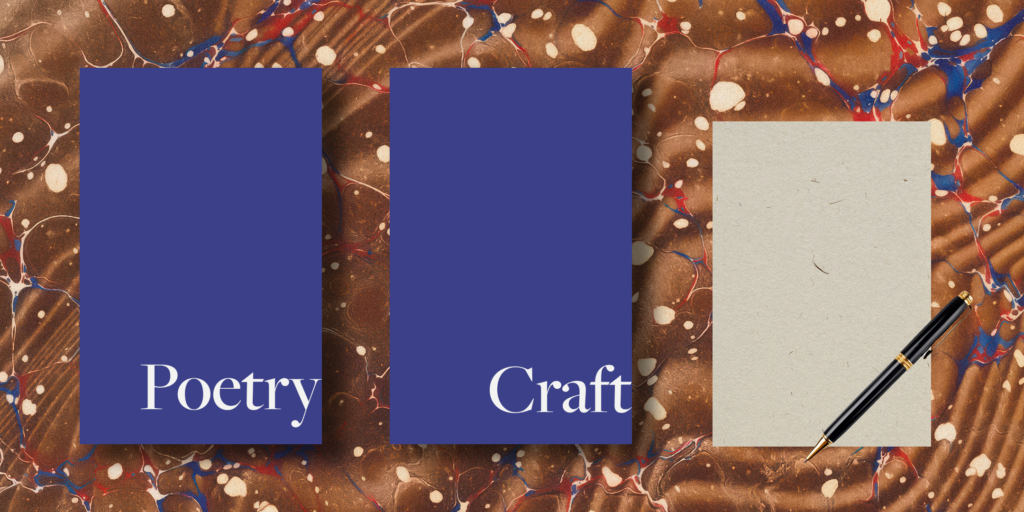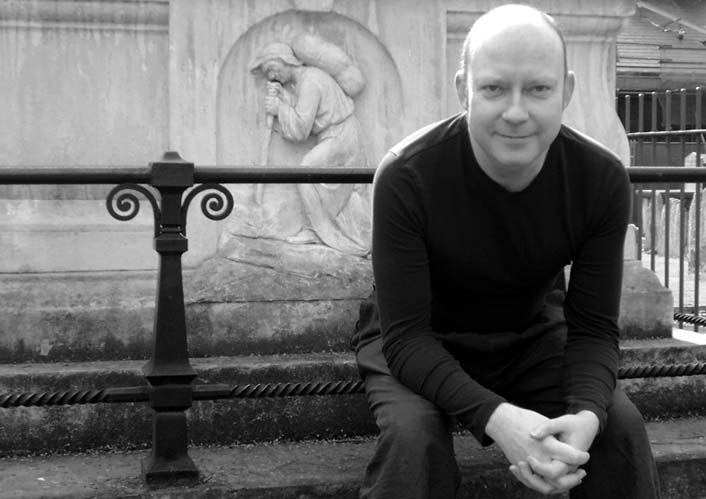In this series, we interview our tutors about poetry craft. Here’s Simon Barraclough discussing his favourite poetic device with examples from other writers’ and his own work.

1. What is your favourite poetic device and why does it resonate with you?
Poetic devices always sound like something Q might trust you with before a secret mission: a magnetic cufflink that can break a line from 100 metres away or a simile that explodes on contact with moonlight. I don’t think I have a favourite device but in my long poem Iarnród Éireann (Broken Sleep Books, 2021) and the ‘sequel’ I’m working on, I try to use a technique that invites the unconscious out of the shadows and onto the page, which results in the scattering of several devices across the surface of a poem.
This involves an initial refusal to edit, a rejection of formal decorum, an enthusiasm for any musical order (or chaos) that the language seems to want to impose, and a willingness (or wilfulness) to let language’s momentum distort the ‘truth’ of autobiographical recall or so-called reality. In this way, devices are welcomed into the poem by way of the language. It’s a kind of symbiosis. The unconscious acts, disruptively, like the black goo in Alien: Romulus or the green serum in The Substance. If required, you can edit it back into shape later on, or try to stabilise it.
2. Can you share a poem or excerpt by another writer where your favourite poetic device is used particularly effectively?
Every writer has (and had) an unconscious, and it’s never entirely under control (in fact, language might be the best medium through which it can propagate, like a cloak of invisibility insinuated between the pane of a mirror and its silvering), so what I’m talking about is nothing new. Some might embrace it more than others, of course, especially in the post-psychoanalytical era.
A poet who swims into mind is the late John Ashbery, and not just because a mirror appears in his most famous poem, which I’m going to repress while thinking of excerpts from other works:
Instant insufficiency edged eerily over our oasis.
Under us, awed angry Airedales adjusted.
Easter week, and during the winter the valleys
Are like yeast. This much I divined, walking,
Then turned my back on the mighty fragment of yesterday.
Everything was at peace with everybody. A dark stone glistened.
(‘Vowels’, John Ashbery)
Some of the results of this technique can be seen in that wild play of assonance and alliteration, and the apparent non sequiturs in the next excerpt (is there such a thing in the unconscious?).
Twenty miles away, in the colder
water of the Atlantic, you gaze longingly
toward the coast. Didn’t you once love someone
there? Yes, but it was only a cat, and I,
a manatee, what could I do? There are no rewards
in this world for pissing your life away, even
if it means you get to see forgotten icebergs
of decades ago peeling off from the mass
to dive under the surface, raising a
mountain of seething glass before they lunge back up
to start the unknown perilous journey
to the desolate horizon.
(‘Dull Mauve’, John Ashbery)
3. Can you share one of your own poems where you have adopted this device, and why you used it for that particular poem?
I should probably paste in a block from Iarnród Éireann. Now that it’s a paste-able, recallable entity, it has left the realm of the unconscious, of course, but bears traces of its birth.
Doorknob like a virus, crowned with spikes
teething through the soft gums of the world, born not astride a grave
but into the mouth of the next nearest person, a phantastic egg
in the womb of the throat: smooth chrome one second,
puffer fish the next, shrapnelling blades into the body politic
the body empathetic, the body pathétique, the sobbing adagio of being.
I was the first to make every movement the adagio.
Forget your marches, your waltzes, your dynamics, your tension,
your contrast, your variety, foie gras this diet of gloom,
button a tunic over your viola torso, your cello hips.
There was a time I piped at a more perilous pitch
marching through slush-soddened streets with scraps of carols
pinched in a wonky lyre on a dinged and battered cornet –
Adeste Fideles; Stille Nacht, heilige Nacht,
Alles schläft, einsam wacht; There is a green hill
far away, without a city wall, where our dear Lord –
Drop thy pipe, thy happy pipe.
Drop thy spear, thy piercing spear.
Drop thy sponge, thy parching sponge.
The droghte of March hath perced to the roote.
So now – I’m home. Not home home, but here home.
A home withdrawn to its hole in the skirting board of history,
afraid of dinghies, of landings, invasions, glueing traps
for its monoglot tongue, gnawing off wishbone-thin limbs,
collecting a small pile of porous bones that will be melted
by snowflakes come winter.
It’s important to note that this technique also invites the whole of your life of reading, repeating and remembering literature into the process.1
4. When should poets use this device or a device at all?
Stop reading this and use it right now. More practically – try this if you want to inject energy and surprise into your lines, your images, your memories and your ambivalent desire to tell the truth without revealing the truth.
- For this reason, there are lots of notes (like this one) at the end of the poem. ↩︎

Simon Barraclough has taught many classes at The Poetry School and is the author of several poetry collections and pamphlets, including his Forward-debut, Los Alamos Mon Amour, Bonjour Tetris, Neptune Blue, Sunspots, Iarnród Éireann, and his brand new book, Divine Hours (Broken Sleep Books, 2024). He devised the multi-poet, multimedia events Psycho Poetica and Vertiginous and toured Sunspots as a one-man show with songs and films in 2015/2016. In 2014 he was writer in residence at the Mullard Space Science Laboratory and is one of three editors behind the new humanity-in-space website Project Aboena. A cinema addict from a very early age, Simon often writes about film and loves to investigate the fruitful similarities and differences between poetry and cinema.
Simon will be teaching a new course with us in Summer 2025. To keep updated please subscribe to our newsletter for for all the latest news regarding our course launches.
Add your Reply
You must be logged in to post a comment.